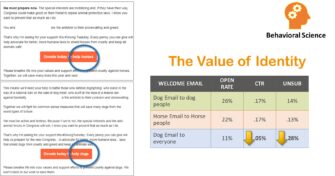Cat People and Dog People
Are you a cat person or a dog person? The answer to that might impact your choice of a (potential) mate. A recent study explored this and the findings dance between “water is wet”to the “trivial” but with just enough “novel” to warrant mention.
Let’s get trivial and water is wet out of the way. The experiment on an online dating site randomized the same male in two different photos, one holding a cat, one not. Women then “swiped” to show interest. The guy with the cat was considered less dateable and desirable for both short-term and long-term relationships. However, that finding was conditional on whether the woman considered herself a cat or dog person and —wait for it…yep, you guessed it: the female cat person liked the male cat person better.
This is about Identity and the values and goals that go with being a cat person. All other things equal (like the experiment) and when made salient (i.e. guy holding cat) we look to reinforce our values and sense of self by choosing somebody like us. How does this play out in charity world for an organization in the animal space?
Donors would willingly share their cat or dog identities if only asked. Alas, they rarely are and even if so, how often does the experience they receive from an organization change as a result?
Instead, the norm is we don’t ask, we don’t know and we thus, unknowingly turn off the cat person with dog content and vice versa. All avoidable if only we’d assign value to knowing.
Consider this experiment we conducted; we asked (dog or horse in this case), we therefore knew, we tailored accordingly. We also maintained a control as point of comparison (last row) where we ignored what we knew.
This ought to be more water is wet but because it is so exceedingly rare to tailor messages to the innate and different motivations of people we have to assume it is anything but.

Now back to our earlier experiment and the novel, interesting part. The researchers had all the participants complete the Big Five personality assessment. Personality is our individual disposition and it dictates a lot of what we pay attention to, find interesting or relevant and elect to act on. And since disposition is largely genetic and innate it naturally precedes our dog or cat affinity and likely plays a causal role in which affinity you become. Not surprising then that cat and dog people have different personalities. Cat people, on average, are higher in neuroticism and openness, while dog people are higher on extraversion, agreeableness and conscientiousness.
The valuable part in all this is to realize that our experiment matching dog message to dog people and horse to horse is scratching the surface of customization. We can now use these generalizable ‘dog’ and ‘cat’ person findings to experiment with different messages for dog people based on Personality.
We know a lot about messaging to each trait and how to get the attention of the Conscientious dog person and how that message should differ for the Extroverted dog person. This can impact message, image, offer, and context.
Maybe dog people are from Mars and cat people from Venus or vice versa.
The real finding here is that there are more interesting, important and useful differences within the dog lover population then between dog and cat people. Your donor segments are likely no different – more differences within each group than between and especially so if those donor segment definitions are internal machinations or worse, composites of lots of random data thrown in a clustering blender.
Kevin



WOOF!